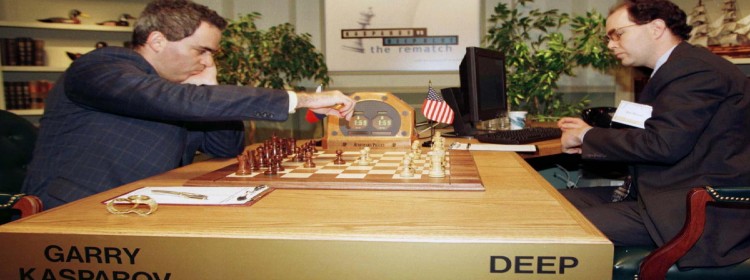There have been many influential chess events in the 20th century. The Openingmaster team took a closer look at them and recommends to check the most notable ones.
It's January 2023 and we just celebrated the New Years Eve and also the G.O.A.T. (Greatest of all times) victory of the chess grandmaster and current World Chess Champion in all three games - Magnus Carlsen. (Magnus Carlsen becomes the triple world champion for the third time in his career holding titles in Classical, Rapid and Blitz)
Will his games become the most influential in the last two decades? Can they compare to what happened in the last century? Let's take a closer look.
You can of course download these and all other chess tournaments instantly in our chess database OM OTB with 9.2. million human chess games.
1972 World Chess Championship between Fischer and Spassky
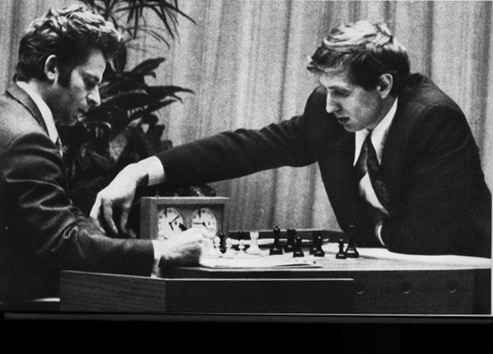
The 1972 World Chess Championship match between Bobby Fischer and Boris Spassky, which was dubbed the "Match of the Century" and received widespread media attention. Fischer's victory over Spassky was seen as a major triumph for the United States during the Cold War, and it sparked a surge of interest in chess around the world.
The match was held in the Laugardalshöll arena in Reykjavik, Iceland, and is considered one of the most famous chess matches of all time.
The duel was highly publicized and attracted significant attention from the media and general public, with the Cold War between the Soviet Union and United States adding an extra layer of tension and political significance to the event. Fischer was seen as representing the United States in the match, while Spassky was seen as representing the Soviet Union and its dominant chess tradition.
The chess game itself was highly competitive and closely contested, with Fischer ultimately emerging as the winner by a score of 12.5-8.5. Fischer's victory ended the Soviet Union's long streak of dominance in the world of chess and made him the first American world champion.
The 1972 World Chess Championship is remembered not only for the high level of play and the historical significance of Fischer's victory, but also for the colorful personalities of the two players and the dramatic moments that occurred during the match. Fischer, known for his unpredictable and sometimes erratic behavior, caused controversy by making last-minute demands and threatening to default the match at various points. Despite these distractions, both players remained focused on the chessboard and delivered some of the highest quality chess of their careers.
The 1972 World Chess Championship remains an important moment in the history of chess and is remembered as one of the most memorable and exciting matches in the history of the game.
1993 World Chess Championship between Kasparov and Short
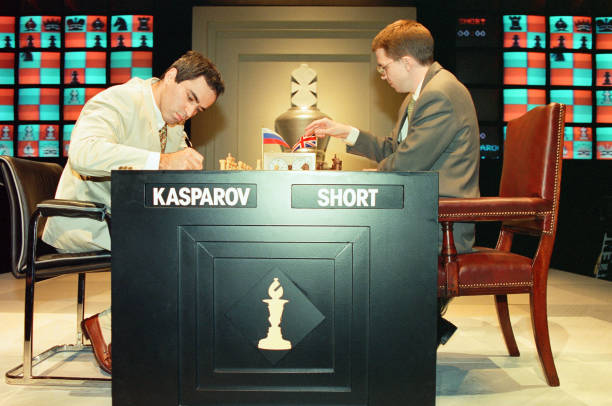
The 1993 World Chess Championship match between Garry Kasparov and Nigel Short, which was the first world championship match to be held outside the auspices of the World Chess Federation (FIDE). This event marked the beginning of the "chess wars," a period of turmoil in the world of chess that lasted for over a decade.
The 1993 World Chess Championship was a match between the reigning champion Gary Kasparov of the Soviet Union (later Russia) and challenger Nigel Short of the United Kingdom. The match was held in London, England and was the first world championship match to be held outside of the Soviet Union since the 1948 match between Mikhail Botvinnik and Vasily Smyslov.
The chess duel was highly anticipated and attracted significant attention from the media and general public. Kasparov, the dominant player of the 1980s and early 1990s, was considered the heavy favorite, but Short was a formidable challenger who had earned his spot in the match by defeating Jan Timman in a candidates match earlier in the year.
The match itself was closely contested, with Kasparov ultimately emerging as the winner by a score of 12.5-7.5. Kasparov's victory cemented his status as the dominant force in the world of chess and solidified his place as one of the greatest players of all time.
The 1993 World Chess Championship is remembered not only for the high level of play and the historical significance of Kasparov's victory, but also for the sportsmanship and professionalism displayed by both players throughout the match. Despite the pressure and intense competition, Kasparov and Short maintained a friendly and respectful relationship, and their match was praised for its fair and gracious conduct.
Overall, the 1993 World Chess Championship was a memorable and exciting event that added another chapter to the rich history of the game of chess.
World Chess Championship cycle of 2004-2005 (chess wars)
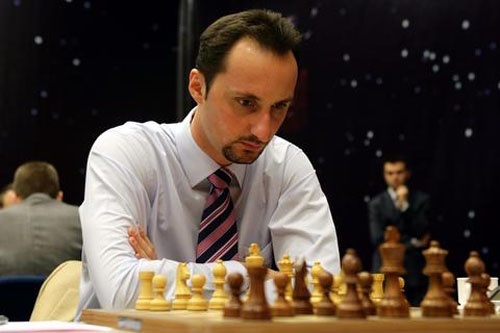
The World Chess Championship cycle of 2004-2005, which saw the reunification of the world chess title after a split that had lasted for over a decade. This was a major milestone for the chess world, and it marked the end of the "chess wars."
The 2004-2005 World Chess Championship cycle was a series of tournaments and matches that determined the challenger for the World Chess Championship, held by champion Vladimir Kramnik of Russia. The cycle began with the 2004 FIDE World Chess Championship, which was a 128-player knockout tournament held in Tripoli, Libya. The winner of the tournament, Rustam Kasimdzhanov of Uzbekistan, advanced to the final match of the cycle to face Kramnik.
The final match of the cycle, the 2005 World Chess Championship, was held in San Luis, Argentina. It was a best-of-14 match played under classical time controls, with Kasimdzhanov facing Kramnik for the title. Kramnik emerged as the winner of the match, defeating Kasimdzhanov by a score of 9.5-6.5 and retaining his title as World Chess Champion.
The 2004-2005 World Chess Championship cycle was notable for a number of reasons. It was the first time that the FIDE World Chess Championship and the classical World Chess Championship were held separately, as a result of the schism in the chess world that had taken place in the early 2000s. It was also the first time that the classical World Chess Championship had been held outside of Europe since the match between Bobby Fischer and Boris Spassky in 1972.
Overall, the 2004-2005 World Chess Championship cycle was an important and historic event in the world of chess, and it helped to determine the direction of the game for the following years.
Deep Blue vs. Gary Kasparov 1997
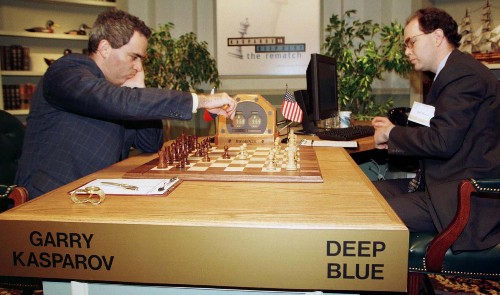
The emergence of computer chess programs as formidable opponents for top human players. Beginning with the defeat of chess grandmaster Gary Kasparov by Deep Blue in 1997, computer chess programs have continued to improve and are now considered to be among the strongest chess players in the world.
The 1997 chess match between Gary Kasparov and Deep Blue was a highly publicized and historic event in the world of chess. Deep Blue was a chess-playing computer developed by IBM, and the match was the second time that Kasparov had faced off against the machine.
The match took place in February 1997 in New York City, and it was a best-of-six contest. Kasparov ultimately emerged as the winner, with a final score of 4-2 in his favor. However, the match was not without controversy, as Kasparov accused IBM of cheating and alleged that the machine had received assistance from human chess players during the match. IBM denied these allegations.
Despite Kasparov's victory, the 1997 match between Deep Blue and Kasparov was a significant moment in the history of chess and artificial intelligence. It was the first time that a machine had managed to defeat a reigning world champion in a match played under standard chess tournament rules, and it marked a major milestone in the development of chess-playing computers.
The 1997 match between Deep Blue and Kasparov was widely covered by the media and attracted significant attention from both the chess world and the general public. It remains a memorable and historic moment in the history of chess and artificial intelligence.
You can of course download these and all other chess tournaments instantly in our chess database OM OTB with 9.2. million human chess games.
These are just a few examples of some of the most influential chess events in the 20th century. Let us know what do you think.
Visit and subscribe to our YouTube channel  to learn chess openings and much more.
to learn chess openings and much more.



